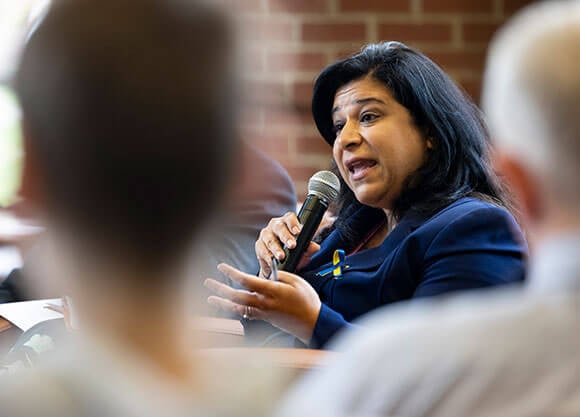
Coming to terms with a crisis and making a commitment in Ukraine
May 03, 2022

May 03, 2022

Instead, she waited her turn like everyone else. When she finally crossed into Tijuana, Bucin saw the heartache and hardship of Russian aggression up close. She saw Ukrainian refugees sleeping in the bushes. She saw 2,000 more refugees inside a nearby gym.
“We've had two refugee crises this year, and this just adds to that recognition that we have a worldwide refugee crisis,” Bucin said. “Having handled the Afghan crisis and now facing the Ukrainian refugee crisis, I just think it’s going to make us face our policies and make us wonder, ‘Are we really prepared to receive and resettle refugees?’”
Bucin posed the question at a recent Quinnipiac panel conversation, “What’s next for Ukraine and the World?” The event was coordinated and moderated by Ambar Pagan ’22, a political science and government major who founded the Quinnipiac Culture Initiative, one of the discussion’s sponsors.
“The horrific war in Ukraine has led to a large-scale humanitarian and refugee crisis and global impacts on food, energy and finance systems,” Pagan told the audience in the Piazza, adding that international relations experts note this is Europe’s fastest forced migration since World War II.
“Our hope for this panel discussion is to engage in an analysis of our international system and to empower students to be critical thinkers of a world they strive to make a change in, and to think about how we can be peacebuilders and solve conflicts,” Pagan added.
More than 5 ½ million Ukrainians have fled their country since the Russian invasion in February, according to May 1 figures from the United Nations. Poland has accepted 3 million refugees, the most of any nation, followed by Romania with 825,000.
Although the U.S. has committed to resettling up to 100,000 Ukrainian refugees, those who do enter the country may not be eligible for healthcare, jobs or a pathway to citizenship. It’s the difference between being refused asylum and being accepted for humanitarian parole, the legal workaround for Title 42 immigration prohibitions.
It’s not a perfect solution, but it’s a bridge to hope at a time when the rules of engagement keep changing.
“We’ve been working in this sort of post-Cold War era,” said Sean Duffy, professor of political science and executive director of the Albert Schweitzer Institute. “During the 1990s, we talked about globalization. Then we were talking about the war on terrorism, at least from an American perspective. But I think people are starting to realize that what’s happening right now may be significant to the structure of the system going forward.”
While inflation, supply chain disruptions and stock market freefalls have made headlines in the U.S., panelists wondered about the impact and morality of sanctions in Russia and throughout history.
“Personally, I've always had very mixed feelings about any sanctions because, in a very strange way, you’re punishing all the people,” said Chris Ball, associate professor of economics, director of the Central European Institute and the Istvan Szechenyi Chair in International Economics.
“Look at the countries where we have imposed long-term sanctions: North Korea, Cuba,” Ball pointed out. “They still have the same regime they’ve had for 50 years, 75 years, whatever it is. So now you have starving people, and you still have the regime you're trying to replace.”
Without a consistent posture of intervention and prosecution on the international stage, it’s hard to address human rights violations and war crimes, said Sujata Gadkar-Wilcox, an associate professor of legal studies and executive director of the Oxford Consortium for Human Rights.
“Legal scholars have said, in fact, the response now is the appropriate response — not a response of war or conflict, but of outcasting,” Gadkar-Wilcox said. “In other words, responding in a way that cuts nations off from the benefits of global cooperation. That is exactly what’s happening now.”
And yet, it’s not entirely that simple.
“You have to think about the implications there as well because you run into some human rights dimensions. So who is really suffering from those sanctions?” Gadkar-Wilcox said. “The legal community is certainly talking about what avenues are available and whether or not international law can, in fact, address this problem.”
For Anat Biletzki, the Albert Schweitzer Professor of Philosophy and human rights activist, the Russian invasion is not novel, despite its portrayal in the West. Although that doesn’t diminish the killing of sovereign people, countries have attacked one another for centuries.
“Don't get me wrong, I'm happy that human rights are in fashion, and everybody is learning the language of human rights,” Biletzki said. “But we need something more than fashionable talk.”
She pointed to the Middle East as one example.
“In Israel and Palestine, I've been saying forever that if we could convince the world that Israel has violated the human rights of Palestinians, maybe we could move forward a bit more than we have in the past,” Biletzki offered. “All I can say is that the Palestinians for the past two months have been yelling and saying, ‘Where have you all been?’”
Quinnipiac Today is your source for what's happening throughout #BobcatNation. Sign up for our weekly email newsletter to be among the first to know about news, events and members of our Bobcat family who are making a positive difference in our world.
Sign Up Now